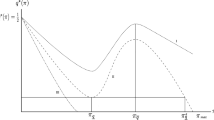Abstract
Two equilibrium possibilities are known to obtain in a standard overlapping-generations model with dynastic preferences: either the altruistic bequest motive is operative for every generation (in which case, Ricardian equivalence obtains) or it is not, for any generation. Dynamic equilibria, where the bequest motive is occasionally operative, cannot emerge. This paper studies bequest-giving behavior and out-of-steady-state bequest and growth dynamics in a Ak model with intra- and inter-generational consumption externalities. These externalities, by their very presence, do not destroy Ricardian equivalence. They may, however, give rise to deviant generations—generations that do not leave a bequest having received an inheritance, and vice versa—and that seals the fate for Ricardian equivalence. Consumption externalities may also generate interesting indeterminacies and endogenous growth cycles that did not exist otherwise.
Similar content being viewed by others
References
Abel A.: Operative gift and bequest motives. Am Econ Rev 77(5), 1037–1047 (1987)
Abel A.: An analysis of fiscal policy under operative and inoperative bequest motives. In: Helpman, E., Razin, A., Sadka, E. (eds) Economic Effects of the Government Budget, pp. 91–106. MIT, Cambridge, MA (1988)
Abel A.: Optimal taxation when consumers have endogenous benchmark levels of consumption. Rev Econ Stud 72(1), 21–42 (2005)
Aiyagari S.R.: Co-existence of a representative agent type equilibrium with a non-representative agent type equilibrium. J Econ Theory 57(1), 230–236 (1992)
Aiyagari S.R., Greenwood J., Sheshadri A.: Efficient investment in children. J Econ Theory 102, 290–321 (2002)
Alonso-Carrera J., Caballé J., Raurich X.: Estate taxes, consumption externalities, and altruism. J Pub Econ 92(7), 1751–1764 (2008)
Alvarez-Cuadrado, F., Long, N.V.: Envy and inequality. mimeo. McGill University. Scand J Econ, forthcoming (2009)
Álvarez-Peláez M.J., Díaz A.: Minimum consumption and transitional dynamics in wealth distribution. J Mon Econ 52, 633–667 (2005)
Barnett R.C., Bhattacharya J.: Rejuveniles and growth. Eur Econ Rev 52, 1055–1071 (2008)
Barnett R.C., Bhattacharya J., Bunzel H.: Resurrecting equilibria through cycles in an overlapping generations model of money. J Macroecon 32(2), 515–526 (2010)
Barro R.J.: Are government bonds net wealth?. J Polit Econ 82(6), 1095–1117 (1974)
Bossi, L., Porqueras, P.G.: Fiscal policy with intertemporally non-separable preferences. ANUCBE School of Economics Working Paper 2010-512, Australian National University (2010)
Caballe J.: Endogenous growth, human capital, and bequests in a life-cycle model. Oxford Econ Pap 47(1), 156–181 (1995)
Constantinides G.M., Donaldson J.B, Mehra R.: Junior is rich: bequests as consumption. Econ Theory 32(1), 125–155 (2007)
Decreuse B.: Dying of selfishness. Econ Theory 17, 481–488 (2001)
de la Croix D., Michel P.: A Theory of Economic Growth, Dynamics and Policy in Overlapping Generations. Cambridge University Press, Cambridge (2002)
Diamond P.A.: National debt in a neoclassical growth model. Am Econ Rev 55(5), 1126–1150 (1965)
Dutta J., Michel P.: The distribution of wealth with imperfect altruism. J Econ Theory 82(2), 379–404 (1998)
Fisher W.H., Heijdra B.J.: Keeping up with the ageing Joneses. J Econ Dyn Control 33(1), 53–64 (2009)
Kitagawa A., Shibata A.: Endogenous growth cycles in an overlapping generations model with investment gestation lags. Econ Theory 25, 751–762 (2005)
Liu W., Turnovsky S.: Consumption externalities, production externalities, and long-run macroeconomic efficiency. J Pub Econ 89(5–6), 1097–1129 (2005)
Matsuyama K.: Growing through cycles. Econometrica 67(2), 335–347 (1999)
Michel P., Venditti A.: Optimal growth and cycles in overlapping generations models. Econ Theory 9(3), 511–528 (1996)
Michel P., Pestieau P.: Fiscal policy in a growth model with both altruistic and nonaltruistic agents. South Econ J 64(3), 682–697 (1998)
Michel P., Thibault E., Vidal J.: Intergenerational altruism and neoclassical growth models. In: Kolm, S., Ythier, J.M. (eds) Handbook on the Economics of Giving, Reciprocity and Altruism, pp. 1055–1106. Elsevier, Amsterdam (2006)
Pestieau, P., Thibault E.: Love thy children or money: reflections on debt neutrality and estate taxation. Econ Theory 1–27 (2010)
Phelps E.S., Pollak R.A.: On second-best saving and game-equilibrium growth. Rev Econ Stud 35, 185–199 (1968)
Seghir A., Torres-Martínez J.: Wealth transfers and the role of collateral when lifetimes are uncertain. Econ Theory 36, 471–502 (2008)
Stockman D.: Balanced-budget rules: chaos and deterministic sunspots. J Econ Theory 145(3), 1060–1085 (2010)
Thibault E.: Existence of equilibrium in an OLG model with production and altruistic preferences. Econ Theory 15(3), 709–715 (2000)
Wälde K.: Endogenous growth cycles. Int Econ Rev 46(3), 867–894 (2005)
Weil P.: Love thy children: reflections on the Barro debt neutrality theorem. J Mon Econ 19(3), 377–391 (1987)
Author information
Authors and Affiliations
Corresponding author
Additional information
We thank an anonymous referee, Chris Sleet, David Stockman, and audiences at the Midwest Economic Theory Meetings in State College, the European Meetings of Econometric Society in Milan, and the Midwest Macroeconomics Meetings in Bloomington for helpful comments.
Rights and permissions
About this article
Cite this article
Barnett, R.C., Bhattacharya, J. & Bunzel, H. Deviant generations, Ricardian equivalence, and growth cycles. Econ Theory 52, 367–396 (2013). https://doi.org/10.1007/s00199-011-0645-3
Received:
Accepted:
Published:
Issue Date:
DOI: https://doi.org/10.1007/s00199-011-0645-3




